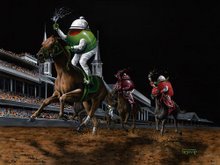| You Are 89% Non Conformist |
 You're incredibly strange. And a weirdness like yours takes skill to cultivate! No one really understands you. And you're cool with that. You just hope you never have to understand them! |



“Just Hitting Another Brick Wall”

LESSONS IN CIVICS & THE CONSTITUTION – L - A
Pennsylvania General Assembly Act III - A
The purpose of this act declared that when the state treasury department could no longer “pay” its debts and was jeopardizing its depositors and creditors, the secretary of banking would be designated as receiver for the treasury and he was to file a certificate of possession in
House Joint Resolution 192 - 1933
(20 years after enactment of the Federal Reserve Act)
Congress enacted HJR-192 to suspend the gold standard and to abrogate the gold clause, on June 5, 1933. This resolution declared that “Whereas the holding or dealing in gold affect the public interest, and are therefore subject to proper regulation and restriction; and whereas the existing emergency has disclosed that provisions of obligations which purport to give the oblige a right to require payment in gold or a particular kind of coin or currency . . . are in consistent with the declared policy of congress . . . in the payment of debts.
NOTE: HJR-192 was suspended during the 1970s and rescinded in the 1980s.
This resolution declared that any obligation requiring “payment in gold or a particular kind of coin or currency, or in an amount in money policy; and. . . Every obligation heretofore or hereafter incurred, shall be discharged upon payment, dollar for dollar, in any coin or currency which at the time of payment is legal tender for public and private debts.”
Around the same time period, a Farm Control Bill had attached to it a clause making Federal Reserve notes legal tender. In 1937, the Supreme Court struck down the Farm Control Act, thus carrying with it the legal tender status of Federal Reserve notes. Before 1933, Federal Reserve notes were used for inter-bank transfers. Then, around 1945, Congress passed a bill which called for the withdrawal of Federal Reserve notes from public circulation; but, they are still with us. . . NOTE that the words do not talk about “payment” of debt, but clearly states that “Every Obligation. . . Shall be discharged.”
In the case of Stanek v. White, 172
Thus, it is clear that, as a result of HJR 192 and from that day forward (June 5, 1933), no one has been able to pay a debt. The only thing they can do is tender in transfer of debts, and the debt is perpetual. The suspension of the gold standard, and prohibition against paying debts, removed the substance for our Common Law to operate on, and created a void, as far as the law is concerned. This substance was replaced with a "Public National Credit" system where debt is money (The Federal Reserve calls it "monetized debt") over which the only jurisdiction is Admiralty and Maritime.
HJR-192 was implemented immediately. The day after President Roosevelt signed the resolution the treasury offered the public new government securities, minus the traditional "payable in gold" clause. Article I, Section 10, Clause 1, proscribes the States making any thing but gold and silver coin a tender in payment of debt -- but, this Article does not contain an absolute prohibition against the States making something else a tender in transfer of debt.
HJR-192 prohibits payment of debt and substitutes, in its place, a discharge of an obligation -- thereby not only subverting, but totally bypassing the "absolute prohibition" so carefully engineered into the Constitution. There is, now, nothing for this Article to operate on, just as there is nothing for Common Law to operate on. Perpetual debt, bills, notes, cheques and credits fall within a totally different jurisdiction than contemplated by Article I, Section 10, Clause 1 -- and that jurisdiction belongs exclusively to the Law of Admiralty and Maritime. Now, it is easy to see how "bills" as plenty as oak leaves, "polluted the laws after the War For
Next Week, September 11th, LESSONS IN CIVICS & THE CONSTITUTION – L - B Pennsylvania General Assembly Act III - B



























|